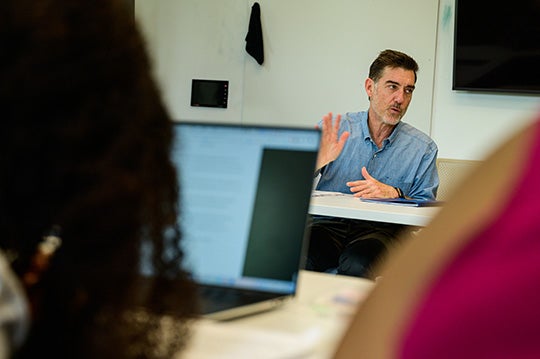
Rice University writer-in-residence Justin Cronin has for years captivated audiences with his award-winning, bestselling novels, including “The Passage” trilogy, which has been translated into over 45 languages and was adapted for television by famed director Ridley Scott helming the production in 2019.
Cronin’s newest book “The Ferryman” was published last summer, debuting as a New York Times bestseller. The novel finds Cronin turning to subjects including aging, family and the ties that bind, all in the fantasy setting of a mysterious utopian island where not all is as it seems. The acclaimed novelist Stephen King called Cronin’s latest “Next to impossible to put down… exciting, mysterious and totally satisfying.”

“It is a family story that deals front-and-center with the intimate bonds between people — friends, parents, kids, lovers, spouses — as the bedrock of human life and the thing that makes life bearable,” Cronin said. “The bittersweet beauty of our time on Earth lies in these connections, which are inevitably broken by the mortal state of being human.”
In addition to “The Ferryman'' and “The Passage,” Cronin has been lauded for his novels “Mary and O’Neil” — which was awarded the PEN/Hemingway Award and the Stephen Crane Prize — and “The Summer Guest.” Rice’s writer-in-residence has also received the Goodreads Reader’s Choice Award in Horror, a Whiting Writer’s Award and fellowships from the National Endowment for the Arts and the Pew Foundation. “The Ferryman” was named one of the best books of 2023 by Amazon and was a finalist for the Goodreads Reader’s Choice Award in Science Fiction.
Before “The Passage” became a worldwide phenomenon, Cronin was a full-time professor of English at Rice, having joined the faculty in 2003. Due to the whirlwind success of the titular first installment of “The Passage” trilogy, Cronin had to step away from teaching full time in order to finish the series, fulfill obligations such as global press tours and ultimately to help shepherd the series’ TV adaptation through the production process.
These days, Cronin is once again instructing the next generation of Rice English students with an interest in creative writing. Starting in 2015, he’s taught one English course during the spring semester, and Cronin would be the first to say that he often leaves the classroom having gleaned as many helpful insights as he’s imparted to his pupils.

Having written “The Ferryman” through the height of the COVID-19 pandemic, which made the inherently solitary work of producing a novel even more isolating, Cronin credits his students with providing him with the camaraderie and support he needed to finish the novel.
“If you get stuck,” he tells his students, “but there’s some other part of the book that you do know and are looking forward to writing, just go write that. Write something. Write the pages!”
“That’s the theme of the class,” Cronin said. “I actually wrote those words to them in the acknowledgements section of ‘The Ferryman,’ because for the last seven years they’ve been my writing community.
“When you’re teaching new writers, college writers, it’s not the super esoteric stuff that you’re talking about; it’s basic principles of narrative design, which is in fact the title of the course.”
Cronin said teaching writing often comes down to repeating lessons he could stand to rehear himself.
“In the midst of writing a novel, every writer can lose track of the basics,” he said. “This has always been true for me. As I like to say, ‘I go in and I teach myself, and the students get to hear it.’”

